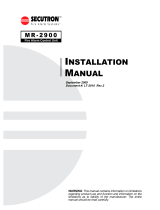
CONVENTIONAL DETECTORS TECHNICAL BULLETIN
Hochiki America Corporation
7051 Village Drive, Suite 100
Buena Park, CA 90621-2268
DWG # HA-06-434, Rev 07/21
PAGE 2 of 11
PART # 1700-12470
You may use 50' spacing on smooth ceilings for DFE-135, DFE-190, DSC-EA heat detectors
You may use 70' spacing on smooth ceilings for DCD-135, DCD-190 heat detectors
*Beams or other obstructions extending more than 18" below the ceiling reduce the effective range of the
detectors. Such obstruction should designate a new separation point and be considered a border for a new
section.
*Beams or other obstructions extending more than 8" but less than 18" require reduced spacing at the
perpendicular of the obstructions.
NOTE: For information on differing styles of construction consult the NFPA 72.
WARNING: Do not install Hochiki smoke detectors in the following areas:
Where temperatures are likely to exceed the operating temperature ranges specified by detector
Closer than 4" to any side wall
Where forced ventilation can dilute the smoke from a fire
In known areas of combustion such as kitchens or furnace rooms
In known areas of sustained corrosive atmospheres such as industrial chemical processing areas
Maintenance
Cleaning
Use clean, dry compressed air to remove dust from a detector, or return to Hochiki America for service. Disassembly of
the detector may result in the failure of the detector to initiate an alarm condition or initiation of a false alarm
condition.
Testing
For a smoke detector to operate efficiently, the combustion products must enter the outer chamber. Air flow,
stratification, velocity, stagnation, and migration all affect the efficiency and accuracy of the detector. Use an air flow
meter to determine the movement of the air within a structure. Field testing equipment is available from Hochiki
America for testing the function of the detectors. Consult local codes and ordinances for maintenance requirements.
Hochiki America Corporation recommends a bi-annual functional testing and visual inspection.
Prior to testing any detector, care should be exercised to ensure proper disabling of live signals and notification circuits
of the Fire Alarm Control Panel. Failure to exercise this procedure may result in false alarm signals which could place life
and property in jeopardy.
Caution: Excessive aerosol smoke can contaminate a detector.
Do not spray in bursts longer than 1 second.
Wait 20 seconds between sprays.
Spray 10 inches from detector.
Test with Smoke Sabre aerosol cans or the Testifier 1000/1001 or
2000/2001 with TS3 smoke capsules.
Testifier usage: To insert the battery baton, hold the Testifire head unit by the handle and depress the upper spring
button on the battery baton. Align the button with the location hole in the handle and push the battery baton into the
handle until the button snaps into place.
1. Insert the other end of the battery baton into the Solo access pole and depress the lower spring button. Align it
with the location hole and push the battery baton further into the pole until the button snaps into place.
2. Remove the capsule from its outer carton and Anti-Static bag.
3. Remove the spring clip protector cap from the new capsule.
4. Holding the capsule by spring clips with the label on the underside, carefully insert the new capsule into the
capsule port. Push it into position, ensuring that the clips spring out positively on both sides of the capsule.
5. Close the access cover securely.
6. Program the tester to the following options available: Smoke or Heat.
7. Raise Testifire over the detector. The detector should touch the base of the inner clear cup.
8. Lower Testifire from the sensor after testing is complete.











